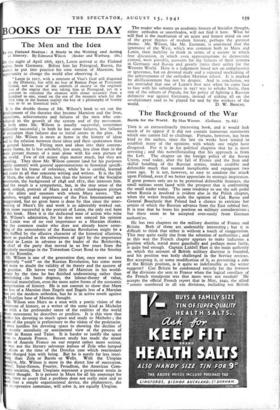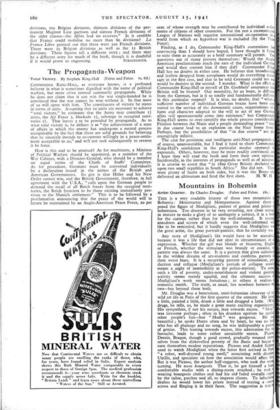The Background of the War Battle for the World. By
Max Werner. (Gollancz. 75. 6d.) THIS is an extraordinarily interesting book, and it would lack much of its appeal if it did not contain numerous statements which one cannot fail to challenge. Fortune, however, has been kind to the author, since the last six weeks have tended to establish many of the opinions with which one might have disagreed. For it is in his political chapters that he is most arresting ; and this notwithstanding that his approach is from the Left. The chapter on the foreign policy of the Soviet Union, read today, after the fall of France and the firm and skilful handling of the Russian armies, makes credible and defensible much that seemed inexplicable and repugnant two years ago. It is not, however, so easy to condone the attack upon Finland, even if we better appreciate its strategic inspiration. If great powers only are to be permitted defensible frontiers, the small nations seem faced with the prospect that is confronting the small trader today. The same tendency to use the soft pedal when Russia is involved is evident also in the Polish chapter, when the writer brushes aside the opinion of Col. Burne and General Boucherie that Poland had a chance to extricate her armies of which the Russian advance from the East robbed her. It is true that he bases his position on military considerations ; but these seem to be accepted over-easily from German authorities.
He has two chapters on the military doctrine of France and Britain. Both of them are undeniably interesting ; but it is difficult to think that either is without a touch of exaggeration. This may quite easily rise from the selection of authorities ; and in this way the French chapter appears to make ludicrous a position which, stated more guardedly and perhaps more fairly, is quite bad enough. Captain Liddell Hart is the main authority on which the account of British military doctrine is founded, and his position was hotly challenged in the Service reviews. But accepting it, or some modification of it, as presenting a side of the British position, is it quite so indefensible as the writer suggests? Can Britain be condemned entirely for the fewness of the divisions she sent to France when the logical corollary of the French standpoint was that more were not needed? He accepts the official French report that in May, 1940, the allied " armies numbered in all zoo divisions, including ten British divisions, ten Belgian divisions, thirteen divisions of the per- manent Maginot Line garrison and sixteen French divisions of the older classes—the Allies had no reserves." Is it credible that France could mobilise no more than 8o divisions? La France Libre pointed out that there were Ho French divisions. There were 25 Belgian divisions as well as the ir British divisions. These figures tell a different story ; and there may be a different story for much of the book, though it is doubtful



























 Previous page
Previous page